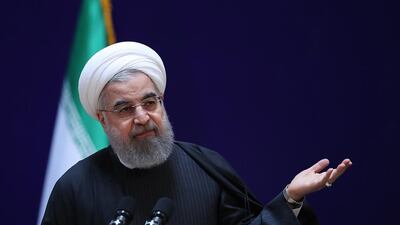If the aim of the Trump administration's decision to toughen its policy towards Iran was to encourage better behaviour on the part of Tehran, it does not appear to have had the desired effect.
On the contrary, looking at the way Iran has reacted to Donald Trump's forthright condemnation of its aggressive meddling in the Middle East, it only seems to have inspired the Iranians to indulge in yet further acts of bad behaviour.
Iran's involvement in Yemen's long-running and bitter civil war is a case in point. The support Iran's Revolutionary Guards have provided to the Houthi rebels in their war against the democratically-elected government of Yemeni president Abdrabu Mansur Hadi has been well-documented.
The Houthis’ ability to withstand the military onslaught of the Saudi-led coalition has been, in large part, due to the arms supplies and training they have received at the hands of the Iranians. The sophistication of the weapons systems provided by Tehran have even enabled the rebels to fire surface-to-surface missiles into Saudi territory, including at least one missile that was fired in the direction of the holy city of Mecca.
Given the overwhelming evidence that already exists about Iran's support for the Houthis, the general expectation among many diplomats was that Tehran would see sense after the US president's no-nonsense warning and tone down its more overt activity.
After all, the Iranians have a great deal to lose if Congress, which the White House has asked to review American policy towards Iran, decides to initiate a range of punitive measures in response for Iran’s persistent threatening conduct.
It could even result in the cancellation of the Joint Comprehensive Plan of Action, the agreement struck in 2015 over Iran's nuclear programme, whereby the US and its allies agreed to lift sanctions in return for Iran scaling down its attempts to develop nuclear weapons.
Yet, rather than heeding Washington’s warning, Iran has simply responded by intensifying its efforts to cause further political instability in the Middle East.
And, so far as Yemen is concerned, US military officials are reporting an upsurge in Iranian attempts to smuggle weapons and other supplies to the Houthis.
Recent US intelligence reports show that the majority of the Iranian arms are being shipped from the port of Bandar Abbas. Some are being landed in Oman, and then shipped overland into Yemen, while others are being transported through the region’s busy sea-lanes. Intelligence officials also report a significant upgrade in the quality of weapons the Revolutionary Guards are shipping to the Houthis, with Iranian-made drones among the latest equipment being used by the Houthis against coalition forces.
_______________
Read more from Con Coughlin
There are many challenges in the wake of ISIL’s defeat, but there are also opportunities
Why Donald Trump is prepared to ditch the Iran nuclear deal
_______________
Iran’s continued support for the Houthis, moreover, is having a negative impact on efforts by the Saudi-led coalition to revive peace talks aimed at ending the conflict, which has now created a humanitarian disaster, with thousands of children said to be at risk of contracting potentially fatal diseases such as cholera.
“Because of Iran’s support, the Houthis do not feel obliged to take the peace talks seriously,” a senior diplomat familiar with the Yemeni peace efforts told me earlier this week. “They have their own territory, they have their own economy and they are free to do as they please - so long as they enjoy Iran’s support.”
Nor is the increase in the activity of Iran's Revolutionary Guards confined to Yemen. The growing confidence of the Iranian-backed Hizbollah militia in southern Lebanon is attributed to the upshift in support it has received from Iran. Having established itself as the dominant force in the south of the country, Hizbollah has now set its sights on extending its influence into Christian and other sectarian areas of the country where previously its influence was limited, if not downright rejected.
Observers believe the more assertive stance being taken by Hizbollah is dangerous for two reasons. Firstly it could result in yet another eruption of violence on Israel’s northern border, thereby provoking yet another regional conflict. They also fear it could encourage Hizbollah to extend its military operations beyond the borders of Lebanon, thereby causing further unrest in a region that has already experienced more than its fair share of conflict in recent years.
But if the Iranians think they can get away with all this unwelcome interference in the affairs of the Arab world, they should think again. For while the Trump administration’s warning to Tehran has not - for the moment at least - ended the nuclear deal, there is a growing resolve among Mr Trump’s national security team to adopt a more robust approach to tackling Iranian meddling.
The likes of defence secretary James Mattis, a former US Marine Corps General, and national security sdvisor HR McMaster, a retired army general, have personal experience of having to deal with Iran's malign influence in the region as a result of commanding U.S. troops in Iraq and Afghanistan.
And, while they might be prepared to tolerate the nuclear deal, they are adamant about halting the spread of Iranian influence in countries like Yemen, Iraq and Lebanon.
In an interview with a news outlet earlier this week, Gen McMaster made it clear he does not believe doing nothing is an option so far as the activities of Iran and proxies like Hizbollah are concerned. Thus, if Iran does not rein in the activities of the Revolutionary Guards and their allies, then there is a growing possibility that the Americans will do the job for them.
Con Coughlin is the Telegraph’s Defence and Foreign Affairs Editor


